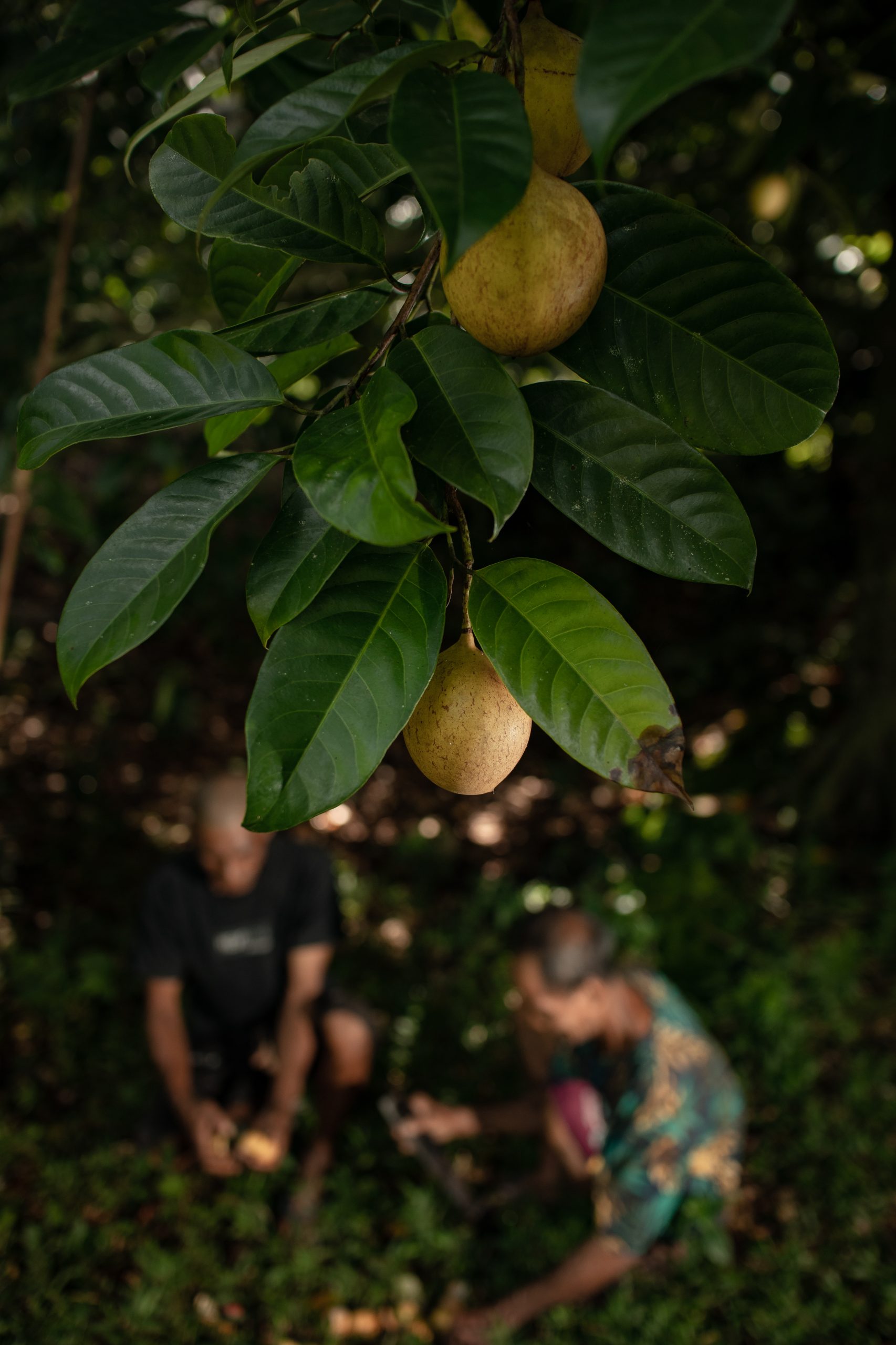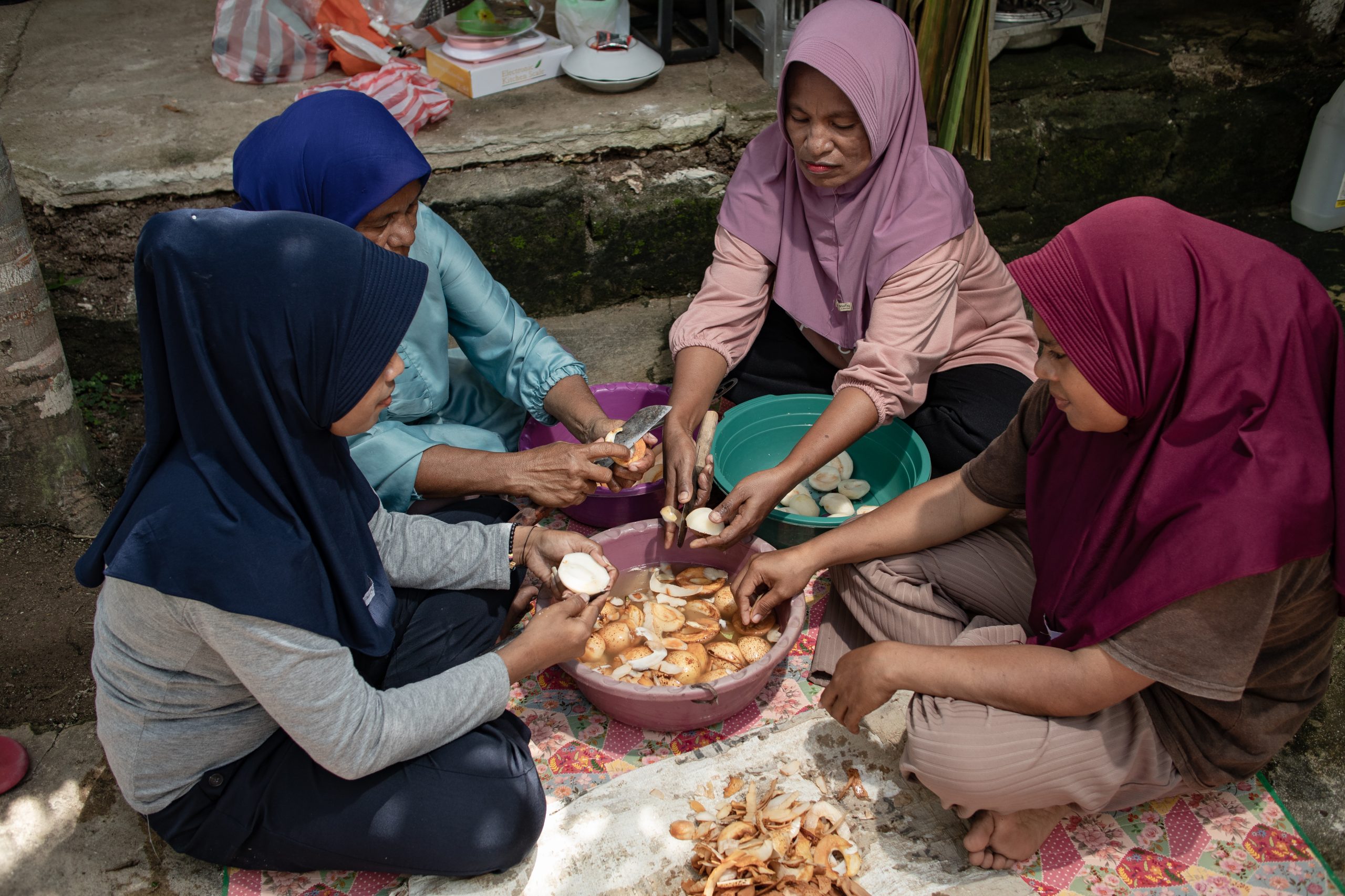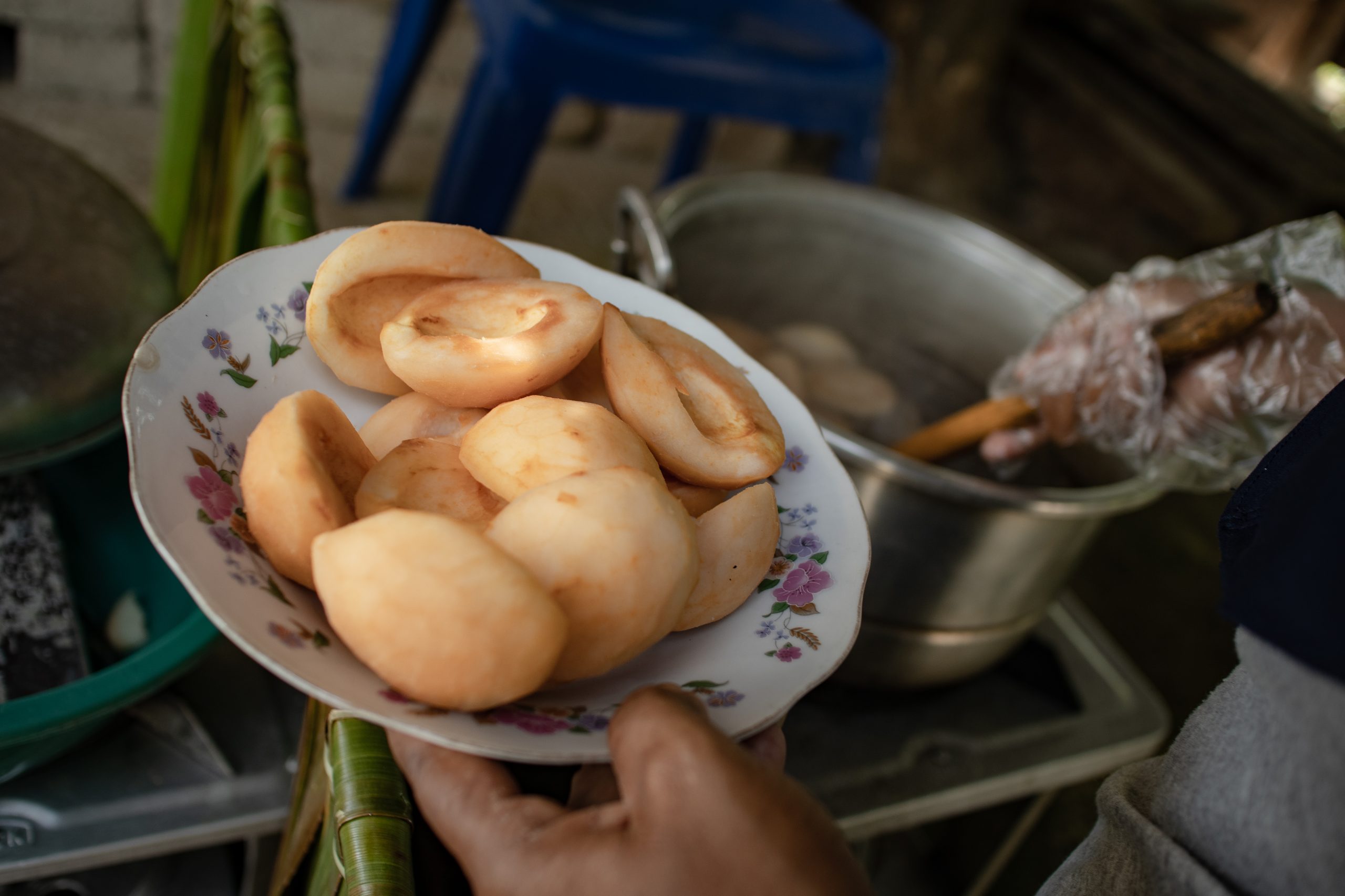“What would you do if you had plenty of nutmeg?”
Four middle-aged women sat in a circle, on a mat in the shady yard of a house. In front of them, three large bowls, one of which contained water and the flesh of freshly peeled nutmeg. Intimate, full of laughter, yet their hands were busy handling the crop.
A woman in a dark blue scarf skillfully peeled the nutmeg with a small knife, then placed the flesh into a bowl of water. Next to her, a woman in a pink scarf carefully sliced the nutmeg flesh thinly with a sharp knife. Meanwhile, two other women took turns grating the nutmeg flesh—one with a manual tool, the other with an electric grater.
In between the activities, Rahima Kelutur, 59 years old, seemed to give directions. She asked a woman to take a cheesecloth and clean water. The cloth was used to squeeze the grated nutmeg flesh. The grated flesh was put in the cloth, water added, and then squeezed to get the juice out. The juice was collected in a large bowl, while the pulp was set aside the mat.

The process continued. The extracted water was placed into a large pot and cooked over a Hock brand kerosene stove. At the same time, granulated sugar was added, and the nutmeg juice mixture was stirred to boil. A fragrant aroma began to burst out of the pot, indicating the nutmeg juice was almost ready to be devoured.

While waiting for the water to boil, the ladies prepared small bottles of 220 milliliters. Those bottles were used to store the juice of the ripe nutmeg. They were excited, though the final product had not been launched commercially yet. So far, it has been for self-consumption during special moments such as Ramadan or holidays.
Processing Nutmeg for the Very First Time
Rahima recalls the moment she first learned to process nutmeg flesh. She learned this while participating in a training in Arewang Village, Pulau Gorom Sub District, Seram Bagian Timur District, Maluku, in May 2024. The training was organized by Yayasan BaKTI in collaboration with the District Government of Seram Bagian Timur.
Returning from the training, Rahima practiced her knowledge straight away. She made jam and juice out of the nutmeg three times at home. Though it was not perfect, she was proud because she managed to process parts of the fruit that had long been considered useless. It bears fruit twice a year. Thus, only a small-scale processing is done at the moment.
Some time ago, at the end of 2023, the initiative to hold technical training in nutmeg processing was addressed in the village plan of Armada Village. Rahima Kelutur took part in the training. Yayasan BaKTI, through the Inclusive Rural Community Livelihood Development Program in Eastern Indonesia (BangKIT), facilitated the planning process in Armada Village to improve the villagers’ access to livelihood. The villagers were involved in developing the village plan. Yes, the villagers and the village administration must work together, mainly because they are the targets of the development. This way, the planning process will produce a plan that pulls out the existing needs and potential, analyzed directly by the villagers. Villagers know best about life in a village, don’t they? For that reason, villagers are the main subject in their livelihood planning.
Nutmeg Flesh Once Cast Off
Armada Village, where Rahima lives, is located in Gorom Timur Sub District, Seram Bagian Timur District. This small village has a population of 279 people as of 2024. It has a relatively challenging topography, consisting of 15 villages with a total size of 22.29 km². To go to the capital of the district in Bula Sub District, people must travel across the sea for 11 hours on a ferry. This ferry only operates twice a week.
The majority of people in Armada Village work as nutmeg, clove, and sago farmers. However, the nutmeg trees bear fruit only twice a year. During the harvest season, every family picks nutmeg in the garden. The harvesting is done traditionally, using small bamboo with a metal hook on its edge to remove the fruit from its twigs.
“Usually, only the seeds and the flowers are picked. The flesh is straightly cast off,” Rahima explained. After joining the training organized by the BangKIT Program, Rahima is now aware of the economic value of the nutmeg flesh.
Rahima then memorized when she took part in making the village sketch and its seasonal calendar during the planning process in Armada Village. It was her first time going through the village planning stages, which first analyzed the village condition. Nutmeg, which is found in abundance in her village, was then analyzed as a potential. Nutmeg now becomes one of the processed products with future economic potential after a livelihood development on nutmeg processing was proposed in the village planning she participated. To improve livelihood in nutmeg processing, a technical training on nutmeg processing was held and attended by Rahima with 35 other participants.
Waste to Benefit
Rahima remembers that in the training, she learned about four products to make from the flesh of a nutmeg: jam, juice, syrup, and sugar-coated nutmeg. In the past, every part of a nutmeg’s flesh was simply thrown away in the garden. Today, they know how to process it.
Peeling the nutmeg, cleaning its flesh, then soaking it in a salt solution for 12 hours. Next, the flesh is grated, squeezed, and the extract is boiled with sugar until it turns into juice.

Similar to Rahima, Nur Jali Kelutur, 45 years old, also feels the benefits of the training. At first, she did not know that nutmeg flesh is processable. After joining BangKIT Program, making sugar-coated nutmeg and juice became a habit. Making sugar-coated nutmeg is pretty simple: the flesh is thinly sliced, soaked in sugar until it dissolves and penetrates into the fruit fiber.
“Once the sugar melts, it is sweet and edible,” she said while keep slicing the nutmeg flesh.
Making nutmeg juice is a slightly different process. The flesh is grated, then squeezed for liquid extraction. Up next, the liquid is cooked with sugar to boil. Before consumption, nutmeg flower is added for extra tartness. Nur said the flower adds more freshness and distinct taste to the juice.
Intangible Economic Potential
Now that the people in Armada Village know how to process the nutmeg flesh, yet unable to enjoy the economic benefits. The products are only for self-consumption or a treat on special occasions. Whereas, according to Rahima, she can have up to 50 kilograms of nutmeg flesh in one harvest, relatively massive for processing and marketing.
Marketing is a major issue for people. So far, there has been no support from the local government in marketing the nutmeg products. There was a visit made by a group of ladies from the PKK, but they simply took home the products for free and did not provide any marketing support.
“We hope to display this product in every exhibition,” Rahima stated with hope. “People need to learn about the marketing system to sell their products.”
Rahima and her fellow housewives dream of making this processed nutmeg as their main source of income. They hope they can form a small business group or village cooperative focusing on nutmeg processing. Further training and broader access to market will bring their products to major cities outside of Maluku, and even further to Java Island.
In addition to its distinct taste and fragrant aroma, the nutmeg product is also believed to have health benefits. Drinking the warm nutmeg juice, is said, will improve immunity, ease digestion, and give a soothing effect.
Future Hope
Rahima, Nur, and other housewives have a strong interest. Not simply learn to process the nutmeg flesh, but also make it their source of income. They expect broader recognition and appreciation for their works.
“We do not only want to produce, but also want to sell. So, the yields will not go to waste,” said Rahima as she wiped the sweat off her forehead.

To them, nutmeg is not just a commodity. Nutmeg is hope. Hope for a more thriving future. Hope for the yields in the village to improve the household economy, and not merely for self-consumption.
One day, if someone asks, “What would you do if you had plenty of nutmeg?” With full confidence, the ladies in Armada Village will say, “We will process it, sell it, and we will be thriving.”